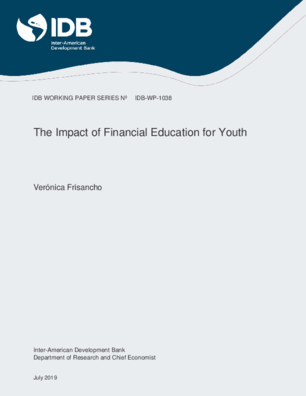The Impact of Financial Education for Youth
Date
Jul 2019
This paper evaluates if the excitement about school-based financial education is warranted. First, relying on recent experimental evidence, the paper takes stock of the impact of financial education programs aimed at reaching children and youth. Second, it complements existing studies by focusing on the potentially negative unintended effects of these programs. Relying on data from a large-scale randomized controlled trial (RCT) in Peru, this paper investigates whether financial education programs have spillover effects on academic outcomes or if they widen initial inequalities due to heterogeneous treatment impacts. While delivery models that incorporate a mandatory course requirement yield large and robust impacts on financial literacy, voluntary after school programs yield meager effects. These gains do not come at the cost of pervasive effects on the probability to pass a grade. Moreover, the impact of school-based financial education seems to be very inclusive, as treatment effects tend to be uniform across different sub-samples.




